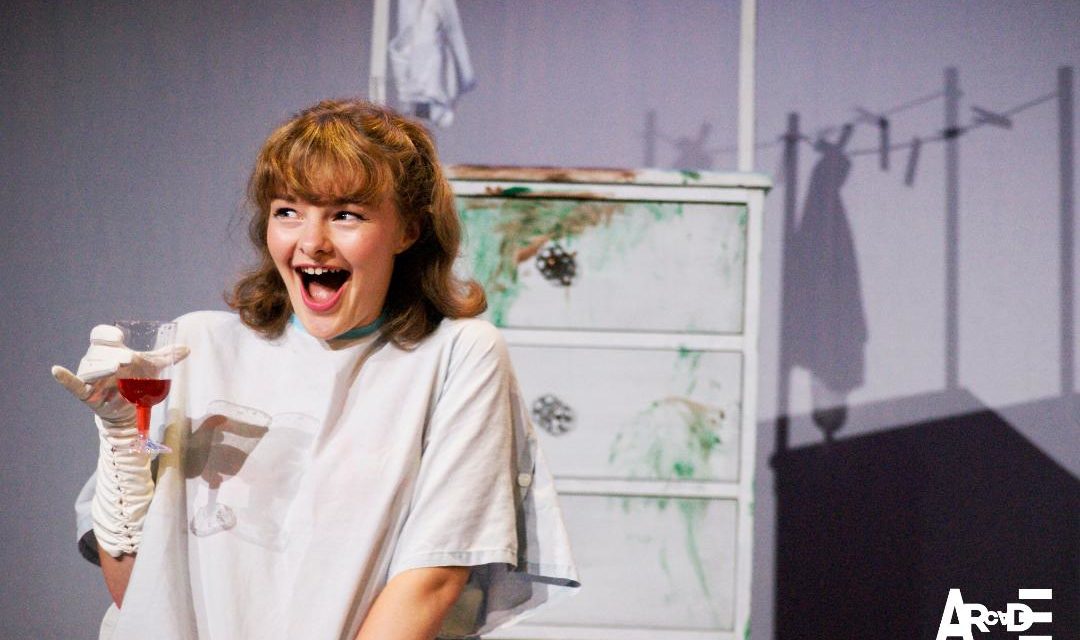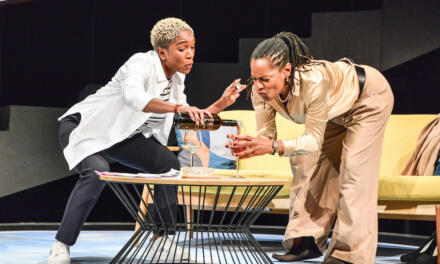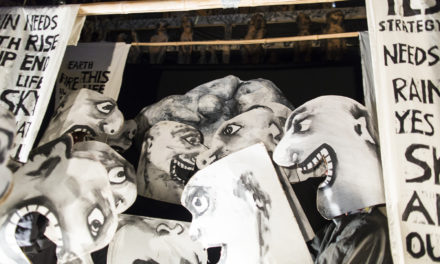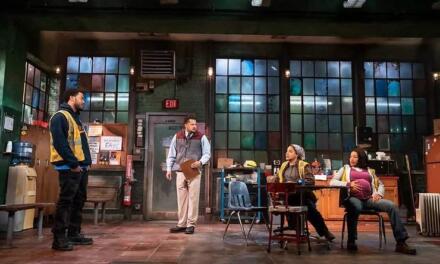The newest theatre company to emerge from Dunedin, New Zealand’s funky, eclectic arts scene is Arcade Theatre Company, helmed by director Alex Wilson. Like the now-disestablished Counterpoint–also initiated by Wilson–Arcade provides a forum for emerging practitioners to test and develop their craft. Its stated aim, according to Wilson, is to “offer…[young actors] opportunities to be involved in bold, adventurous theatre projects with a broad appeal” (The Star, February 25, 2018). Wilson is familiar with the Dunedin theatre scene, having completed his undergraduate degree at the University of Otago, and subsequently having worked in the city as a theatre director, producer, actor, and general “man of the theatre.” For the Arcade’s premiere outing, he chose to direct Jo Randerson’s absurdist black comedy, Fold. As the venue for this production, Wilson selected Allen Hall Theatre, the University of Otago’s theatre, which is associated with experimental work and well known in Aotearoa/New Zealand as a performance laboratory.
Written by Randerson in “the back of someone’s garden” (Fold And Shudder, p. 1) in 1995 as part of the Young and Hungry season at Wellington’s BATS Theatre, Fold depicts five vacuous characters in a series of increasingly grotesque birthday parties, giving each other gifts that are never opened, engaging in meaningless conversation, and eventually spurning one of their number when he loses his job and confesses the true bleakness of his life. Although the six young actors involved in the piece are still in the process of honing their professional performance skills (most are graduates–or current students–of the university’s Theatre Studies or Bachelor of Performing Arts programmes), each displayed admirable commitment, immersing themselves in their roles, yet deftly emphasizing the absurdism required to achieve Randerson’s grim yet funny work. Similarly the crew and design team–again, almost all of whom are emerging practitioners–delivered skillful and imaginative work within the circumscription of Randerson’s defined stage directions. What struck me after seeing Wilson’s accomplished production of Fold was how remarkably relevant the work remains more than twenty years after Randerson wrote it. In this post-truth world, troubled with human misery on many fronts and where opinion can be construed as objective fact, Fold caustically critiques the most negative of human impulses and behaviors and forces us to see the worst possible versions of ourselves.
As the play progresses it is clear that every theatrical signifier in Fold is laden with meaning from the distressed white set to the identical never-opened birthday gifts and costume fragments. One of Fold’s most arresting visual tropes–the “poetry” that emerges from “concrete and objectified images” as Martin Esslin would have it (Theatre Of The Absurd, p 26)–occurs after each party when the characters move upstage and meticulously change their white underpants, hanging the used pair on a clothesline. Although I have seen several productions of this play, this visual metaphor remains highly potent, depicting so much of what is troubling about a society that casts off responsibility for its fellow man, refuses to take blame, and dispenses with consumer items after one use.
Fold’s set design also foregrounded how compelling screen images have become for us in the contemporary world. As the audience entered the theatre, they encountered the five principal actors moving around the space, blindfolded and wearing hospital gowns, each adorned by one costume accessory: a fur stole, a bow-tie, a pair of braces. On the set, television screens of several sizes played static while one screen displayed short advertising fragments from the 1980s for consumer products such as spray-on hair. Increasingly, the audience ceased their pre-show chat and began to watch the screen, although it was clear that the play had not yet begun. As more audience members arrived, they moved quickly–almost apologetically–to their seats, aware that their fellow spectators were riveted silently to the television screen. They, too, began watching. Through this seemingly simple theatrical device, Wilson and videographer Orion Carey-Clark illustrated how pervasively screens are privileged over human interaction in our daily lives and reinforced Martin Esslin’s assertion that television has wrought a “decisive cultural and social change” (The Age Of Television, p. vii).
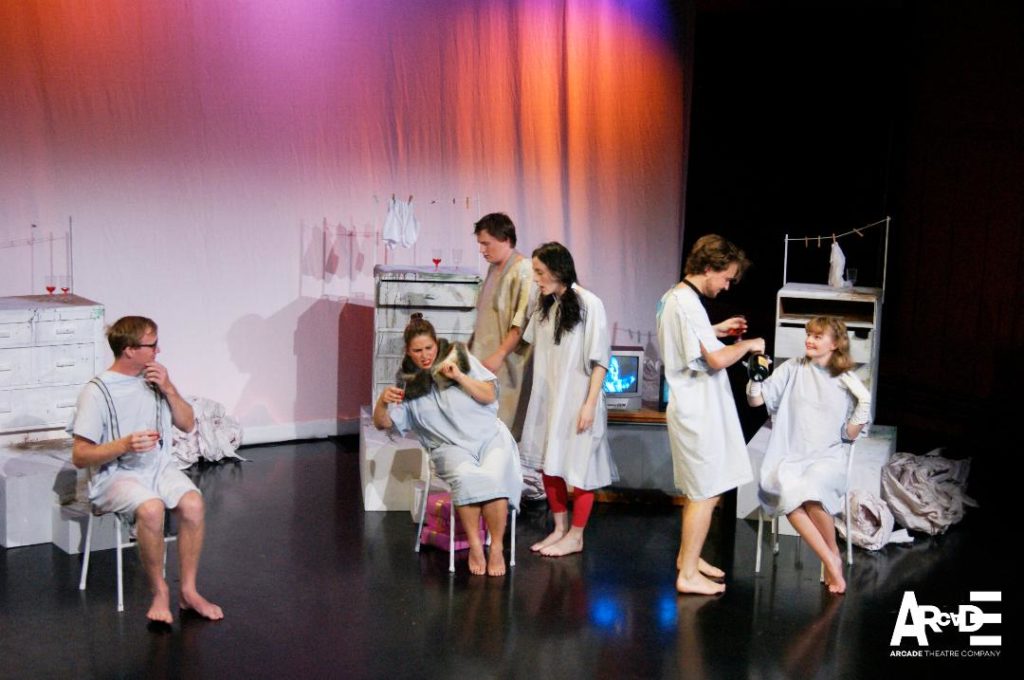
Alex Martyn as Pascall, Marea Colombo as Eileen, Ben McCarthy as John, Sam Shannon as Eileen’s Daughter, Nick Tipa as Roger and Abby Howells as Karen in Fold by Jo Randerson, presented by Arcade Theatre Company at Allen Hall Theatre and directed by Alex Wilson. Photo by Angus McBryde.
In addition to the five partygoers, Randerson has created two other characters, Eileen’s young daughter–whom Eileen ignores, belittles and physically attacks–and Glitterman, a one-dimensional song-and-dance man who assures us, in the two songs that bookend the play, that everything will be alright if only we simply think positively. Characters Karen and Pascal echo this sentiment:
PASCALL […]Those who claim to be victims of rape are really buying into the cycle of oppression[…]
KAREN Nothing exists unless you let it.
ROGER Aren’t you just blinding yourselves to reality?
PASCALL We call it positive reframing. (Fold, p. 10)
Randerson’s trenchant critique remains breathtakingly current amid current movements such as Time’s Up and Me Too.
In his introduction to the play, David O’Donnell claims that “Randerson’s work strongly resembles Theatre of the Absurd” (“Introduction” to Fold, p. v). For Martin Esslin, Theatre of the Absurd “strives to express its sense of the senselessness of the human condition” (Theatre Of The Absurd, p. 24) and aims to “[confront]…audiences with a grotesquely heightened and distorted picture of a world that has gone mad” (Theatre Of The Absurd, p. 410). Without a doubt, Randerson’s play and Wilson’s production achieve these aims. Yet there are elements of Fold that aberrate from Esslin’s definition of Theatre of the Absurd. O’Donnell suggests that Fold elicits “a sense that all is not lost, that the world can be redeemed” (“Introduction” to Fold, p. vi). Moreover, for Esslin, in Absurdist works, “the audience is confronted with characters whose motives and action remain largely incomprehensible (Theatre Of The Absurd, p. 411); yet Fold’s avaricious, morally bereft characters behave in ways that are grotesque yet frighteningly recognizable, especially in an era where “truth” remains a slippery concept.
The day after I saw Fold, I attended a performance at Dunedin’s Fortune Theatre–the city’s professional theatre company. The play was Jeeves And Wooster In Perfect Nonsense by David and Robert Goodale, which premiered in the United Kingdom in 2013, although it was based on characters created by author P. G. Wodehouse in the 1930s. The production was as committed and energetic as Fold; like Fold it was directed by a talented emerging practitioner (Jordan Dickson, winner of Dunedin Theatre Award for Best Emerging Talent in 2017 and a contemporary of Wilson’s), and like Fold, was meta-theatrical in form. Yet, despite Dickson’s inventive direction and the Jeeves And Wooster actors’ committed and highly proficient performances, Fold struck me as the more relevant and immediate work. Of course, this is an extremely unfair comparison. After all Jeeves And Wooster In Perfect Nonsense is not meant to be an absurdist political and social commentary; its aim is pure entertainment. Yet I can’t help but be compelled by theatrical pieces like Fold that entertain but also generate profound thought and reflection, that remain current, and politically edgy and biting.
Works Cited
Esslin, Martin. The Age Of Television. London and New York: Routledge, 2001.
Esslin, Martin. The Theatre Of the Absurd (3rd edition). New York: Vintage Books, 2004.
Harwood, Brenda. “Young Actors Focus Of New Dunedin Theatre Company.” The Star (Dunedin, NZ), 25 February 2018.
Randerson, Jo. “Fold.” Fold And Shudder, Wellington, N.Z.: The Play Press, 2003, pp. 3 – 28.
This post was written by the author in their personal capacity.The opinions expressed in this article are the author’s own and do not reflect the view of The Theatre Times, their staff or collaborators.
This post was written by Hilary Halba.
The views expressed here belong to the author and do not necessarily reflect our views and opinions.

